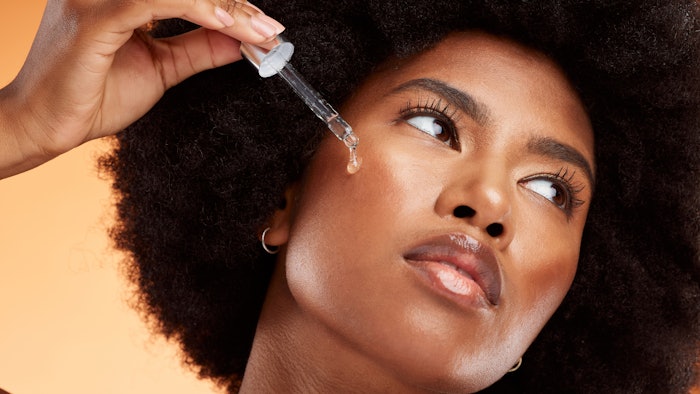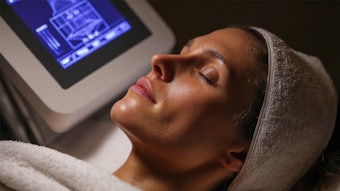
“People of color” is a term that has made its way into our common vernacular, but what does it really mean? It’s important to understand that melanin-rich skin works differently, and needs different care than its lighter counterpart.
Melanin plays the vital role of filtering out the damaging effects of UV radiation and free radicals that penetrate into the dermis to break down collagen and essential skin proteins. As melanin has a protective role in our skin, our melanocytes also increase melanin production in response to skin insults to upregulate that protection. This heightened protective melanin response results in uneven pigmentation or hyperpigmentation, which has traditionally been treated with ingredients like hydroquinone, strong concentrations of chemical exfoliants, and even skin bleaches. Such strategies can easily lead to greater compromise of the skin barrier and even more hyperpigmentation as a result. Instead, if we strengthen our skin barrier by nourishing skin’s natural renewal cycle with optimal ingredients, melanocytes will not work harder as the skin is well protected and hyperpigmentation will correct..
Below, I outline some key ingredients that work best for darker skin tones because they build the skin barrier, balance melanin production, without irritating the skin.
1. Retinol (Vitamin A) with Glycolipids
Retinol (vitamin A) with Glycolipids strengthens the skin barrier by promoting healthy cell turnover and boosting the production of collagen and elastin, while making it more resilient to external damages such as UV rays and pollution. Glycolipids are lipid molecules that help maintain the skin's moisture barrier. By preserving the integrity of the skin's outer layer, glycolipids lock in hydration and protect against irritants that can cause inflammation and damage.
Retinol with glycolipids also reduces and fades dark spots and hyperpigmentation by exfoliating the skin and encouraging the replacement of pigmented cells with new ones. This helps fade dark spots and even out skin tone, including issues with hyperpigmentation that can be more prominent in darker skin tones. The glycolipids keep the skin hydrated and healthy and support the even distribution of melanin, preventing patches of pigmentation.
2. Stabilized Vitamin C (Tetrahexyldecyl Ascorbate)
Tetrahexyldecyl Ascorbate (aka stabilized Vitamin C) is a multifunctional ingredient that works on different levels of skin care. Its stable and lipophilic nature allows for better penetration into the skin, thus offering enhanced efficacy. Additionally, it is less acidic than L-ascorbic acid, which means any one with sensitive or dry skin can use it without experiencing any burning or skin barrier breakage.
Tetrahexyldecyl Ascorbate can reduce melanin production by inhibiting the enzyme tyrosinase. This leads to a decrease in skin pigmentation and helps in lightening dark spots, thereby giving a more even and radiant complexion. By stimulating collagen production, this form of vitamin C improves the overall texture and elasticity of the skin. Collagen aids in maintaining skin's strength and firmness, contributing to a plumper and more youthful appearance.
While Tetrahexyldecyl Ascorbate is not a substitute for sunscreen, its antioxidant properties can provide a secondary defense against the harmful effects of UV radiation. By neutralizing free radicals generated by UV exposure, it assists in minimizing damage to skin cells. Exposure to UV rays can cause inflammation and redness in the skin. Tetrahexyldecyl Ascorbate has anti-inflammatory properties, which can reduce UV-induced redness and inflammation, aiding in the skin's natural healing process.
3. Glycolipids
Glycolipids play a crucial role in maintaining the skin's barrier function, offering several benefits. Glycolipids are part of the lipid matrix in the stratum corneum, the outermost layer of the skin. They help maintain the structural integrity of this barrier, ensuring that it stays flexible and intact.
They contribute to the skin's ability to retain moisture by helping to create a seal that prevents excessive water loss. This can result in softer, more hydrated skin. The skin barrier acts as a protective shield against environmental pollutants, allergens, and pathogens. Glycolipids aid in this protective function, reducing the risk of irritants and harmful substances penetrating the skin. Some glycolipids are involved in skin healing and renewal processes, supporting the natural regeneration of damaged or stressed skin.
4. Dimethylmethoxy Chromanol
Dimethylmethoxy Chromanol (DMC) is a synthetic molecule with some properties that can benefit the skin, including the potential to brighten, strengthen and protect darker skin tones. DMC has strong antioxidant properties, meaning that it can neutralize harmful free radicals produced by UV radiation. Free radicals can lead to skin damage and premature aging. By combating these molecules, DMC may help protect the skin from UV-induced harm.
Similar to UV radiation, blue light from electronic devices may also produce free radicals. DMC's antioxidant activity may help neutralize these, protecting the skin from potential damage. DMC is able to reduce the production of melanin (extra melanin that produces hyperpigmentation). This may be particularly beneficial for darker skin tones, where uneven pigmentation might be more noticeable.
5. Ashwagandha
Stress hormones can affect the skin, leading to problems like acne, dullness, and uneven skin tone. Indian Winter Cherry, also known as Ashwagandha, is known for its ability to lower cortisol levels, potentially improving the appearance of the skin by reducing the impact of stress.
Ashwagandha is able to regulate melanin production, the pigment responsible for skin color. This regulation could help with conditions like hyperpigmentation. This ingredient also neutralizes free radicals and HEV (visible, blue light). Ashwagandha might help to improve blood circulation, ensuring that the skin receives adequate nutrients and oxygen. Better circulation might lead to a healthier complexion, enhancing the skin's natural glow and vibrancy.
Collagen is crucial for maintaining the skin's elasticity and youthful appearance. Some studies suggest that Ashwagandha may support collagen production, though more research is needed to confirm this effect. Indian Winter Cherry promotes wound healing and reduce scarring, which can be particularly beneficial for those dealing with acne marks or other skin blemishes.
6. Tetrapeptides
Tetrapeptides are small protein fragments made up of four amino acids, and have various strong benefits, including effects on collagen synthesis, brightening and overall skin barrier protection. These effects can be beneficial for darker skin tones.
Some tetrapeptides help in reducing hyperpigmentation and promoting an even skin tone. They may inhibit the production of melanin (the pigment responsible for skin color, but an over production can lead to hyperpigmentation/dark spots), leading to a brighter and more radiant complexion. This can be particularly beneficial for darker skin tones, where uneven pigmentation may be more noticeable.
Some tetrapeptides increase skin hydration by promoting the synthesis of hyaluronic acid, a molecule that binds water in the skin. Hydrated skin appears plumper, smoother, and more vibrant. Adequate hydration is essential for all skin types and can help alleviate dryness and flakiness. Some Tetrapeptides promote wound healing and the repair of damaged skin by regulating any inflammatory responses and promoting the growth of new tissue. This can be beneficial in treating scars and marks, which may be of particular concern in darker skin tones, where post-inflammatory hyperpigmentation might be more pronounced.
7. Sea Moss (Red Algae)
Sea moss is a type of red algae that is suitable for all skin types, and has shown unique benefits for darker skin tones compared to other skin tones. Sea moss is known for its ability to hydrate the skin. It can hold lots of moisture, which can help the skin appear smoother, plumper, reducing the appearance of fine lines and wrinkles. When skin is hydrated, there is a true radiance. Sea Moss is also a natural emollient and softens the skin and improves texture and provides a healthy glow.
Darker skin tones may be more prone to hyperpigmentation. Since sea moss has antioxidant properties, it may help in reducing hyperpigmentation by neutralizing free radicals and evening out skin tone. If individuals with darker skin tones have specific concerns about inflammation, acne, or skin irritation, sea moss's anti-inflammatory benefits can help soothe the skin. There are some claims that sea moss can promote skin healing, which might be useful in treating scars or minor skin injuries. This could be beneficial for people who suffer from acne scars or other blemishes.
Know Your Ingredients
My goal is to help her patients learn to respect and embrace their melanin. A helpful approach for caring for our skin’s melanin is “skin cycling,” which focuses on all the steps of our natural skin renewal cycle, ‘calms’ melanocytes, and allows them to produce healthy amounts of melanin. People of color can use the process of skin cycling to work with their melanin, not against it.
Dr. Simran Sethi has practiced Internal Medicine for over 16 years. She is a graduate of the Medical College of Wisconsin and completed her Internal Medicine residency training at Santa Clara Valley Medical Center, San Jose. She then went on to get her Masters of Business Administration at University of Pennsylvania’s Wharton Business School. Simran’s background as an internist has provided her a strong foundation in understanding the essentials in achieving and maintaining optimal health, from the inside and out. Her mission with her MedSpa, RenewMD and medical-grade skincare line, skin by Dr. Simran Sethi is to empower women who have struggled to find the right skincare products and treatments for their melanated skin, and to celebrate and care for their complexion by working with this process rather than against it.










